Question #6
HOTSPOT –
To complete the sentence, select the appropriate option in the answer area.
Hot Area:
Correct Answer:
Privacy and security.
As AI becomes more prevalent, protecting privacy and securing important personal and business information is becoming more critical and complex. With AI, privacy and data security issues require especially close attention because access to data is essential for AI systems to make accurate and informed predictions and decisions about people. AI systems must comply with privacy laws that require transparency about the collection, use, and storage of data and mandate that consumers have appropriate controls to choose how their data is used. At Microsoft, we are continuing to research privacy and security breakthroughs (see next unit) and invest in robust compliance processes to ensure that data collected and used by our AI systems is handled responsibly.
Reference:
https://docs.microsoft.com/en-us/learn/modules/responsible-ai-principles/4-guiding-principles
Question #7
DRAG DROP –
Match the types of AI workloads to the appropriate scenarios.
To answer, drag the appropriate workload type from the column on the left to its scenario on the right. Each workload type may be used once, more than once, or not at all.
NOTE: Each correct selection is worth one point.
Select and Place:
Correct Answer:
Box 3: Natural language processing
Natural language processing (NLP) is used for tasks such as sentiment analysis, topic detection, language detection, key phrase extraction, and document categorization.
Reference:
https://docs.microsoft.com/en-us/azure/architecture/data-guide/technology-choices/natural-language-processing
Question #8
You are designing an AI system that empowers everyone, including people who have hearing, visual, and other impairments.
This is an example of which Microsoft guiding principle for responsible AI?
- A. fairness
- B. inclusiveness
- C. reliability and safety
- D. accountability
Correct Answer: B
Inclusiveness: At Microsoft, we firmly believe everyone should benefit from intelligent technology, meaning it must incorporate and address a broad range of human needs and experiences. For the 1 billion people with disabilities around the world, AI technologies can be a game-changer.
Reference:
https://docs.microsoft.com/en-us/learn/modules/responsible-ai-principles/4-guiding-principles
Question #9
DRAG DROP –
Match the Microsoft guiding principles for responsible AI to the appropriate descriptions.
To answer, drag the appropriate principle from the column on the left to its description on the right. Each principle may be used once, more than once, or not at all.
NOTE: Each correct selection is worth one point.
Select and Place:
Correct Answer:
Box 1: Reliability and safety –
To build trust, it’s critical that AI systems operate reliably, safely, and consistently under normal circumstances and in unexpected conditions. These systems should be able to operate as they were originally designed, respond safely to unanticipated conditions, and resist harmful manipulation.
Box 2: Fairness –
Fairness: AI systems should treat everyone fairly and avoid affecting similarly situated groups of people in different ways. For example, when AI systems provide guidance on medical treatment, loan applications, or employment, they should make the same recommendations to everyone with similar symptoms, financial circumstances, or professional qualifications.
We believe that mitigating bias starts with people understanding the implications and limitations of AI predictions and recommendations. Ultimately, people should supplement AI decisions with sound human judgment and be held accountable for consequential decisions that affect others.
Box 3: Privacy and security –
As AI becomes more prevalent, protecting privacy and securing important personal and business information is becoming more critical and complex. With AI, privacy and data security issues require especially close attention because access to data is essential for AI systems to make accurate and informed predictions and decisions about people. AI systems must comply with privacy laws that require transparency about the collection, use, and storage of data and mandate that consumers have appropriate controls to choose how their data is used
Reference:
https://docs.microsoft.com/en-us/learn/modules/responsible-ai-principles/4-guiding-principles
Question #10
HOTSPOT –
To complete the sentence, select the appropriate option in the answer area.
Hot Area:
Correct Answer:
Reliability and safety: To build trust, it’s critical that AI systems operate reliably, safely, and consistently under normal circumstances and in unexpected conditions.
These systems should be able to operate as they were originally designed, respond safely to unanticipated conditions, and resist harmful manipulation.
Reference:
https://docs.microsoft.com/en-us/learn/modules/responsible-ai-principles/4-guiding-principles
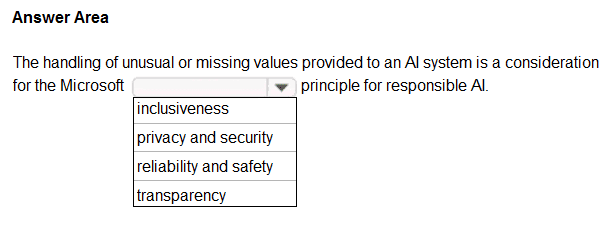
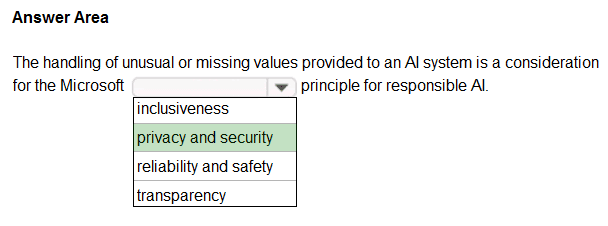
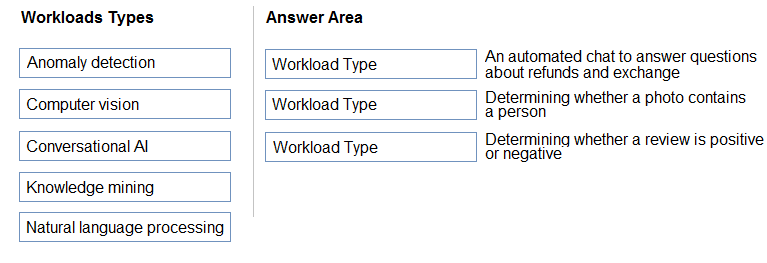
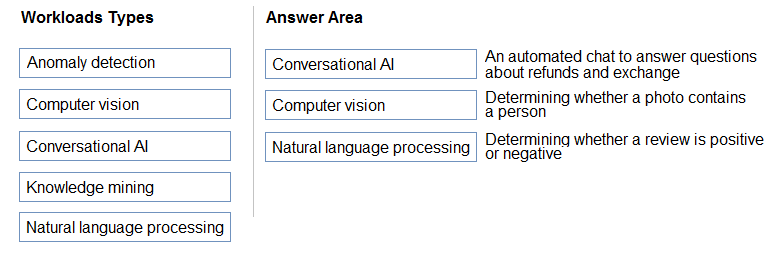
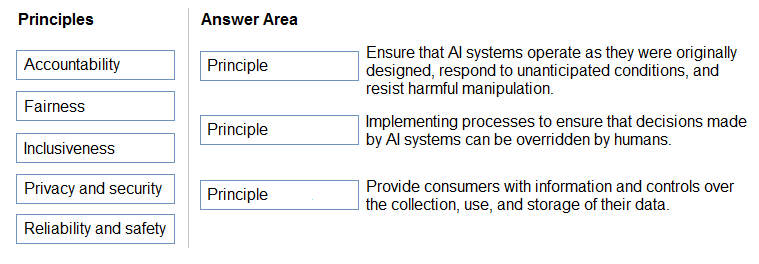
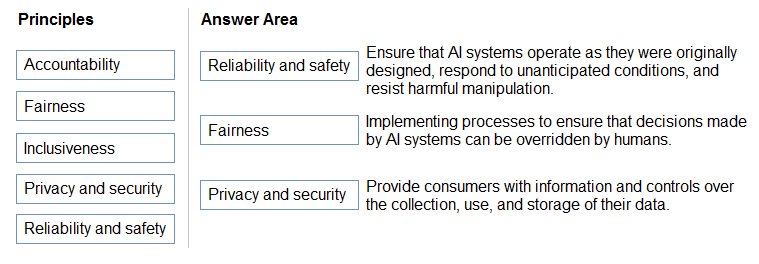






good